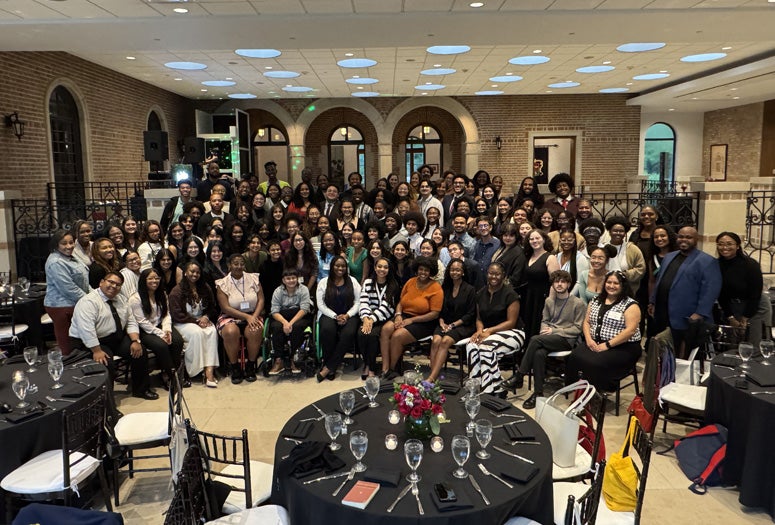The Southeast Regional conference of the Mellon Mays Undergraduate Fellowship (MMUF) Program unfolded at Rice University Nov. 1-3, gathering undergraduate fellows from across the Southeast to present their research, connect with peers and explore graduate school opportunities. The annual conference is an essential component of the fellowship, which aims to diversify the professoriat by supporting undergraduate scholars committed to greater equity in the academy as they pursue Ph.D.s in the humanities and selected social sciences.
“All of the fellows descended on Rice to present their work to each other, to talk to one another, to make each other better by listening to and questioning and criticizing and encouraging each other’s work,” said Alexander Byrd, vice provost of diversity, equity and inclusion. “These people who are here today are the folks who are going to be leading our universities in schools of social sciences and arts and sciences in the humanities into the next generation.”
MMUF has cultivated thousands of scholars since its founding in 1988 with many fellows going on to become professors and mentors themselves.
“We’ve got this intergenerational mentoring that happens,” Byrd said. “People in leadership positions at the university now get to be in front of students as kind of models. And for us, we get to hear what the next generation is thinking and doing, which informs our work in the present.”
The conference featured keynote addresses by Rice alum Fay Yarbrough, William Gaines Twyman Professor of History and senior associate dean of humanities, and celebrated author Kiese Laymon, the Libbie Shearn Moody Professor of English at Rice.
“It feels like this amazing opportunity for me to give something back to a program that gave me so much,” Yarbrough said. “I can honestly say I would not be in this job — I don’t think I would be a professor anywhere — were it not for Mellon.”
For Yarbrough, MMUF is a deeply personal journey that began when she joined the program as an undergraduate in 1995. Recounting how the program helped shape her path, Yarbrough shared a story of the late Edward Cox, her former adviser and Rice professor emeritus of history, who first introduced her to the idea of graduate study.
“He asked me what I wanted to do after I graduated,” Yarbrough said. “At the time, I wasn’t totally sure.”
Cox, however, had a vision and encouraged Yarbrough to attend graduate school and get a Ph.D. in history, a route Yarbrough had never considered but soon embraced as she applied for MMUF.
“It’s an amazing gift, because it isn’t just the time that you’re on campus as an undergrad; Mellon keeps helping you and creating this network for you,” Yarbrough said. “The Mellon Foundation clearly thought about how to help you get into graduate school but also what you then needed to be successful.”
Laymon, who became a Mellon Mays Fellow in 1996, echoed Yarbrough’s sentiment on the fellowship’s transformative impact.
“On the ground level, it’s gotten me in doors — the name Mellon gets you in doors,” Laymon said. “It’s just an incredible program that taught me the kind of professor I wanted to be as opposed to teaching me how to become a professor.”
A key message Laymon hoped to convey to the undergraduates who attended his keynote was the importance of honoring their backgrounds.
“If you come from places where there aren’t a lot of professors, the idea is that you have to forsake all that you were to become something different,” Laymon said. “In my experience, you need to take the best of home with you. Stylize that and become the writers, the researchers, the activists you want to be.”
Rice students shared their own journeys within the Mellon Mays community. For Jaquelyne Bardales, a senior studying sociology and social policy analysis, the fellowship offered a newfound understanding of research in the social sciences.
“I had this idea that [research] was like a lab coat and no idea that social science and humanities research existed, to be honest,” Bardales said. “So entering this space has really opened my eyes, and it’s just been amazing.”
Bardales, who expressed gratitude for the network of supportive peers and mentors, sees the conference as an inspiring showcase of future scholars. At the event, she presented a paper entitled “Are Community Colleges Supporting Texas Students?” drawn from her research on community college outcomes in the Lone Star State.
“I love the Mellon conference, because you get to see all the work that everyone is doing and they’re asking amazing questions,” Bardales said.
Samantha Peltrau, a junior majoring in English, said she found a similar sense of direction within the fellowship. Her conference presentation, “Appropriations of Medieval History in 21st Century Cinema,” drew on her expertise in her major as well as from her interest in media studies.
“I think now that I’ve started to do research and start conversations with other people, I feel really in my element,” Peltrau said.
With fellowship alumni like Yarbrough and Laymon now guiding today’s students, MMUF remains a powerful force for change, creating a pipeline for diverse academic leadership and ensuring future scholars are able to see the paths before them as both attainable and essential.
“You have to see it before you can achieve it,” Yarbrough said. “Otherwise, it’s just not in your universe of possibility.”

